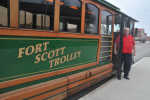Classroom, fieldwork part of upcoming hunter ed course

Area youth will get a chance to learn about proper hunting practices just in time for the start of turkey season.
An upcoming hunter education course, offered through the Kansas Department of Wildlife and Parks and VFW Post No. 1165, will take place from 6:30 to 10 p.m. Tuesday, March 13, and Thursday, March 15, at Fort Scott Community College. Hours will be 8 a.m. to noon Saturday, March 17, at Gunn Park Shelter House No. 7.
The course tests students' ability to master rules and regulations regarding safe hunting practices. Hunting enthusiasts who are at least 11 years of age may participate in the course, which consists of classroom and field work, as well as a final written and practical examination on proper gun handling.
"We teach people to be a more safe, conscientious hunter," master hunting safety instructor Darrell Bloomfield said.
The classroom portion of the course will take place on Tuesday and Thursday at FSCC with registration starting at 6:10 p.m. each evening. The final portion of the course, which includes testing and a trail walk designed to test participants' skills in different hunting scenarios, will take place Saturday at Gunn Park. All needed course supplies are provided by program instructors. Students must be present all three days to become certified.
Bloomfield, who has been involved in the program for more than 25 years, said he is proud of the high pass rate for students who participate in the course each year.
"We're running about a 99 percent pass rate," he said.
Participation numbers have been "up and down" in recent years, Bloomfield said.
"The last course in Uniontown had 35," he said. "Generally, we have between 15 and 50, depending on where we're at and the time of year."
Bloomfield said the March sessions will take place right before the start of turkey hunting season in the spring. Other classes will be offered in August, September, October and November in Uniontown prior to the beginning of the fall and winter hunting season for deer, quail and waterfowl.
Topics covered during the classroom portion of the course include hunting ethics, gun laws, types of animals to hunt in Kansas, gun handling, archery, first aid and survival, drugs and alcohol and firearm safety. Students will learn about all actions of the guns and will handle mock weapons used for training purposes.
"They look real, but they can't be fired," Bloomfield said. "They are training aids only."
Students will also watch films on improper firearm handling.
Animals that can be hunted in Kansas include pheasant, quail, prairie chickens, deer and antelope.
One learning activity is the laser shot, in which participants use mock guns equipped with lasers to fire at prey, such as duck and quail, that are replicated on a computer screen. Each hunter's shot is recorded. The bird falls on the screen if it is killed and the participant receives a score.
"It's a simulated hunt on the screen, where quails and pheasants pop up," he said. "It's like a high-priced video game."
Students are not required to pass the laser shot test, which is part of the three-day course. They receive a combined score at the end of the three-day session.
On Saturday, participants will walk through a mock hunt involving several stations and engage in live fire of .22-caliber rifles and bows at targets. There will also be a clay pigeon shoot.
Finally, students must take and pass a 52-question written test in which they are allowed to miss eight questions.
The class has a group of highly-trained, knowledgeable instructors, Bloomfield said.
"Most of our instructors have been doing it for quite a spell," he said. "One thing we teach is that there is not a stupid question to ask in that class. That's what we tell them."
Bloomfield said the program has been successful in helping to keep hunting-related accidents in Kansas down each year. He noted there were no hunting-related fatalities reported in Kansas last year.
"There were a very insignificant amount of things reported in Kansas as a whole," he said. "We're not saying you're going to be an expert when you come out of this; we just teach the basics. They have to learn some things on their own."
After completing the course, participants will receive a card that they carry with them until age 27 stating they have successfully completed the course. The certificate notes his or her weapons qualifications and understanding of hunting rules and regulations. If they lose the certification, another card costs $12.50. At age 16, they are required by state law to buy a hunting license, Bloomfield said.
